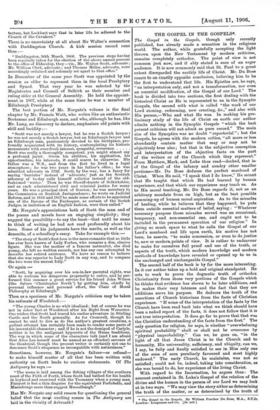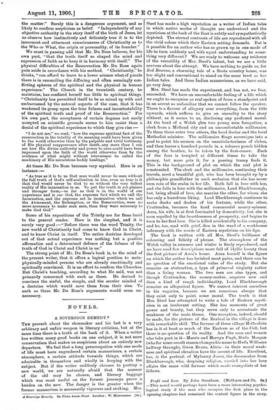THE GOSPEL IN THE GOSPELS*.
The Gospel in the Gospels, though only recently published, has already made a sensation in the religious world. The author, while gratefully accepting the light thrown upon the New Testament by modern criticism, remains completely orthodox. The point of view is not common just now, and if ably stated is sure of an eager audience. It is now commonly said that St. Paul to a great extent disregarded the earthly life of Christ. Mr. Du Bose comes to an exactly opposite conclusion, believing him to be the first to understand that life. His Epistles are, he says, "an interpretation only, and not a transformation, nor even an essential modification, of the Gospel of our Lord." The book is divided into two sections, the first dealing with the historical Christ as He is represented to us in the Synoptic Gospels, the second with what is called "the work of our Lord atoning, redeeming, new creating, 8r,c.," and also with His person,—Who and what He was. In making his pre- liminary study of the life of Christ on earth our author admits nothing in the Synoptic Gospels "which the best present criticism will not admit as pure record." The main aim of the Synoptics was no doubt " reportorial " ; but the Gospels, he agrees with the modern critics, "all more or less abundantly contain matter that may or may not be objectively true also; but that is the subjective conception and interpretation of the objective facts on the part of the writers or of the Church which they represent." From Matthew,. Mark, and Luke thus read—docked, that is, of the Gospel of the infancy and sundry other smaller portions—Mr. Du Bose deduces the perfect manhood of Christ. When He said, "I speak that I do know," He meant that He taught that which He had learned by human experience, and that which our experience may teach us. As to His moral teaching, Mr. Du Bose regards it, not as an arbitrary mandate from on high, but as the best possible summing-up of human moral aspiration. As to the miracles of healing, while he believes that they happened, he puts them outside essential matters of belief, saying : "Whatever necessary purpose those miracles served was an occasional, temporary, and non-essential one, and ought not to be included in the permanent operation of our religion." In giving so much space to what he calls the Gospel of our Lord's manhood and life upon earth, his motive has not been, he asserts, "to make concession, or even to do justice to, new or modern points of view. It is rather to endeavour to make for ourselves full proof and use of the truth, or aspects of the truth, which modern knowledge and modern methods of knowledge have revealed or opened up to us in the unchanged and unchangeable Gospel."
The second half of the book is by far the more interesting.
In it our author takes up a bold and original standpoint. He sets to work to prove the dogmatic truth of orthodox Christianity from those very portions of the Gospels which he thinks that evidence has shown to be later additions, and he makes their very lateness and the fact that they are additions serve his purpose. He deduces the truth of the assertions of Church historians from the facts of Christian experience. "If some of the interpretation of the facts by the Church have been read back into what we think should have been a naked report of the facts, it does not follow that it is not true interpretation. It does go far to prove that that was the Christian understanding of the facts from the first." The only question for religion, he says, is whether "overwhelming spiritual probability" shall or shall not be overcome by "physical improbability." Can we, he goes on, "in the light of all that Jesus Christ is to the Church and to humanity, His universality, sufficiency, and ubiquity, can we, I say, be fully and finally satisfied to see in Him only one of the sons of men peculiarly favoured and most highly endowed." The early Church, he maintains, was not so satisfied; could not be, indeed, taking into consideration, as she was bound to do, her experience of the living Christ.
With regard to the Incarnation, he argues thus : The account contained in St. Luke's Gospel of the relation of the divine and the human in the person of our Lord we may look at in two ways. "We may view the story either as determining the truth of the matter, or as determined by the truth of
* The Gospel in the Gospels. By William Poreher Du Bose, M.A., S.T.D. London : Longmana and Co. [Sc. neta
the matter." Surely this is a dangerous argument, and as likely to confirm scepticism as belief. "Independently of any objective authority in the story itself of the birth of Jesus, let us observe how instinctively and delicately true it is to the innermost and uttermost consciousness of Christianity as to the Who or What, the origin or personality, of its founder."
We must in passing add that Mr. Du Bose believes, for his own part, "that the truth itself so shaped the mind and expression of faith as to keep it in harmony with itself." The physical difficulties of the Resurrection Mr. Du Bose again puts aside in accordance with his method. "Christianity," he thinks, "can afford to leave to a lower science what of puzzle there is in reconciling the differing and often seemingly con- flicting spheres of the spiritual and the physical in human experience." The Church in the twentieth century, he maintains, has confined herself too little to spiritual things. "Christianity has permitted itself to be so mixed up with and embarrassed by the natural aspects of the case, that it has weakened its grasp upon the true fulness and incontestability of the spiritual truth and proof of the Resurrection." For his own part, the acceptance of certain dogmas not easily accepted on scientific grounds seems to him easier than a denial of the spiritual experience to which they give rise :—
"I do not see," we read, "how the supreme spiritual fact of the resurrection in the totality of its meaning could have been given to the world otherwise than by the palpable and vivid testimony of His physical reappearance after death, any more than I can see how His divine authority and power to save could have been impressed upon the faith of the world otherwise than by the evidence of what might without irreverence be called the machinery of His miraculous bodily healings."
At times Mr. Du Bose becomes very mystical. Here is an instance
" As true as it is to us that man would never be man without the full truth of God's self-realization in him, even so true is it that God would never be God to us without the very fullest reality of His incarnation in us. To put the truth in yet plainer and stronger form,—so far as God is in the world of our experience and is our God, the supreme fact which we call the Incarnation, and the supreme act in incarnation which we call the Atonement, the Redemption, or the Resurrection, were no snore necessary to make man man, than they were necessary to make God God."
Some of his expositions of the Trinity are far from lucid to the general reader. Here is the simplest, and it is surely very good :—" Before there was the word Trinity, the new world of Christianity had come to know God in Christ, and to know Christ in itself. The entire doctrine developed out of that actual experience was nothing but a positive affirmation and a determined defence of the fulness of the truth of God in Christ and Christ in us."
The strong point of Mr. Du Bose's book is, to the mind of the present writer, that it offers a logical position to meta- physically-minded persons who are already emotionally and spiritually convinced. It is an effort to confirm the Churches. But Christ's teaching, according to what He said, was not primarily concerned with such as these. He desired to convince the sinful, the simple, and the secular minded of a doctrine which would save them from their sins. To such as these Mr. Du Bose's arguments would seem un- necessary.



































 Previous page
Previous page